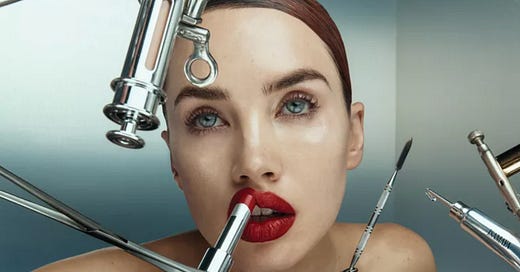Is Isamaya Ffrench's new Core Collection a product of empowerment or manufactured insecurity?
Syringe-shaped products are the new tools of wellness.
Is the answer to empowerment found in a new makeup line or is it merely an illusion? Let’s dive in.
…
Isamaya Ffrench is a British makeup artist and founder of her eponymous beauty brand. She’s like the Chappell Roan of makeup, using the visual medium to create wearable art that pushes the boundaries and leaves a lasting (re: shocking) impression.
In 2023, she revived basic beauty packaging from its dry spell with a comically large, penis-shaped lipstick encased in a silver chrome finish. For $95, you could achieve hot lips, and now, two years later, she’s swapped out the schlongs for syringes.
Her new “Core Collection” features a curated lineup of beauty essentials: a lip balm, lip liner, color-correcting serum, mascara, a blush and highlighter duo, and more. Each product is housed in the brand’s famous mirrored packaging, but made to look like the medical instruments you’d find in a plastic surgeon’s office. Think: A color-correcting bottle that looks identical to a vial of Botox or a lip gloss tube that mimics a syringe. While I find the packaging to be 2016-coded (you know, the whole era of “get that BBL girl, you earned it!!”), you could argue with me and say that it’s unique, creative, and unlike anything on the market. You could even say that it’s indicative of how aesthetic procedures have become the “norm,” or, in my opinion, a societal requirement (but that’s a tangent for another day).
And sure, on the surface, the collection is playful and cheeky. But when you cut through the kitsch and dissect the dialogue surrounding the launch, it goes beyond skin-deep. The “Core Collection,” according to Isamaya, is meant to symbolize wellness and self-care.
“This line of skincare-infused makeup products, housed in strong and timeless chrome packaging, are the tools for anybody who wants to feel empowered in the truest version of themselves,” Isamaya said.
But is it really though?? The sentiment is contradictory when you consider how the plastic surgery-looking products would trigger a need to “fix” yourself. Think about it: Applying a syringe-shaped eye de-puffer (already an insecure-provoking product) every morning and evening would likely lead to thoughts about improving the area altogether with something more potent, like, perhaps, a syringe loaded with filler to smooth and soften the under-eyes.
When you’re participating in methods of self-improvement—whether consciously or subconsciously—there’s always a desire to look better even if it makes you feel worse. That’s the foundation cosmetics is built on: Brainwashing consumers into thinking they aren’t enough by manufacturing “problems” so that they can sell you their elixirs and potions.
And since the “Core Collection” is a makeup line, after all, it’s a double whammy. Not only are you hoping to improve your skin through its skincare-infused formula, but you’re hoping to enhance or alter your appearance through the use of makeup. Which is a touchpoint Isamaya herself noted: “We’re at a time when people don’t want to cover up everything; they just want to enhance. Of course, you can do little bits of retouching afterward, but it’s a really beautiful overall glowy finish.” Enhance, retouch, beautiful—these vapid buzzwords tell us nothing useful about the effectiveness of the products, yet they invoke a sense of urgency to look better.
She wasn’t so subtle with this narrative in an interview with Vogue, alluding to the fact that, with her collection, you could skip the plastic surgeon’s office and get the same effects at home—you know, in the name of empowerment.
“People expect more from cosmetics now that ‘we’re all kind of skin experts now,’” she said, “…I often have conversations with people who really want that five-point lift, but don’t want injectables. So a lot of the products here were developed as an opportunity to take control. I wanted to, I suppose, give people options and say you don’t have to go to your doctor’s clinic.”
The messaging isn’t just misleading, it’s harmful. Makeup, although transformative, cannot achieve the same results as a facelift or lip filler or any cosmetic procedure. Deceiving consumers isn’t empowering. Promoting physical alteration and pretending it’ll lead to self-acceptance also isn’t empowering.
I’m not sure what’s more disappointing: the fact that Isamaya is promoting her line with snake oil salesman-type marketing when she doesn’t need to resort to that or that she’s a beauty expert and should arm her customers with education and realistic expectations (or do what most artists do and challenge the system).
Worst of all, everyone, including media, influencers, etc., are dazzled by the novelty of the line that they aren’t raising concerns over the messaging.
And although I hate to be that person who raises a red flag, I’m concerned the collection is being touted as an act of self-care and a celebration of empowerment when the promotion, products, and packaging elicit insecurity. I’m concerned that no one feels the need to push back and say, “Yes, you created a cool, creative line—but they’re not exactly tools for wellness.”
I’m concerned that Isamaya called this line “the future of beauty” when it doesn’t move the needle forward and further enforces beauty standards that are impossible to achieve, especially when you’re only armed with lip balm and mascara.
If innovation is truly at the forefront, then why are we resorting to 1950s marketing tricks and outdated ideals? Call me a curmudgeon, but I don’t want my makeup to look like a scalpel and suggest that sculpting my face with a slicer is the answer to empowerment.






